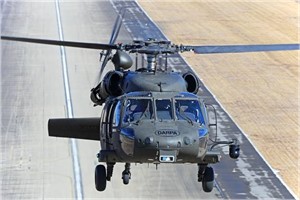ALIAS Equipped Black Hawk Helicopter Completes 1st Uninhabited Flight
- Achievement made possible by development of flexible, extensible automation architecture
The DARPA Aircrew Labor In-Cockpit Automation System (ALIAS) program completed a first ever flight of a UH-60A Black Hawk helicopter without anyone onboard. Sikorsky, a Lockheed Martin company, completed 30-minutes of uninhabited flight with the optionally piloted vehicle (OPV) over the U.S. Army installation at Fort Campbell, Kentucky on February 5th. An additional uninhabited flight was also conducted on February 7th.
[Note: DARPA will hold a virtual press briefing at 11:00AM EST on Tuesday, February 8. DARPA’s ALIAS program manager and the director of Sikorsky Innovations will be available to answer questions. Media may receive an access link by contacting: Outreach@darpa.mil]
The Black Hawk was retrofitted with Sikorsky MATRIX™ autonomy technologies that form the core of ALIAS and can change the way aviators and air crews execute their missions by providing assistance when flying with limited visibility or without communications.

Global Military Helicopter - Market and Technology Forecast to 2027
Market forecasts by Region, by Platform, and by Component. Country analysis, Market Overview, Opportunity Analysis, and Leading Companies
Published: August 2019 - Pages: 222 pages
Download free sample pagesALIAS is a flexible, extensible automation architecture for existing manned aircraft that enables safe reduced crew operations, which facilitates the addition of high levels of automation into existing aircraft. It also provides a platform for integrating additional automation or autonomy capabilities tailored for specific missions.
“With reduced workloads pilots can focus on mission management instead of the mechanics,” said Stuart Young, program manager in DARPA’s Tactical Technology Office. “This unique combination of autonomy software and hardware will make flying both smarter and safer.”
The ALIAS program has leveraged the considerable advances in aircraft automation systems over the past 50 years, as well as similar advances in remotely piloted aircraft. Even in today’s most automated aircraft, pilots must still manage complex interfaces and respond to unexpected situations.
ALIAS aims to support execution of an entire mission from takeoff to landing, including autonomously handling contingency events such as aircraft system failures. Easy-to-use interfaces facilitate supervisor-ALIAS interaction.
“With ALIAS, the Army will have much more operational flexibility,” said Young. “This includes the ability to operate aircraft at all times of the day or night, with and without pilots, and in a variety of difficult conditions, such as contested, congested, and degraded visual environments.”
The Army is currently exploring potential use cases for technologies such as ALIAS, including those outlined in the U.S. Army’s Future Vertical Lift (FVL) program.
Within the next month, the ALIAS program plans to conduct the first flight of a fly-by-wire M-model Black Hawk at Fort Eustis, Virginia.
Source: DARPA
Date: Feb 9, 2022
View original News release



No comments:
Post a Comment